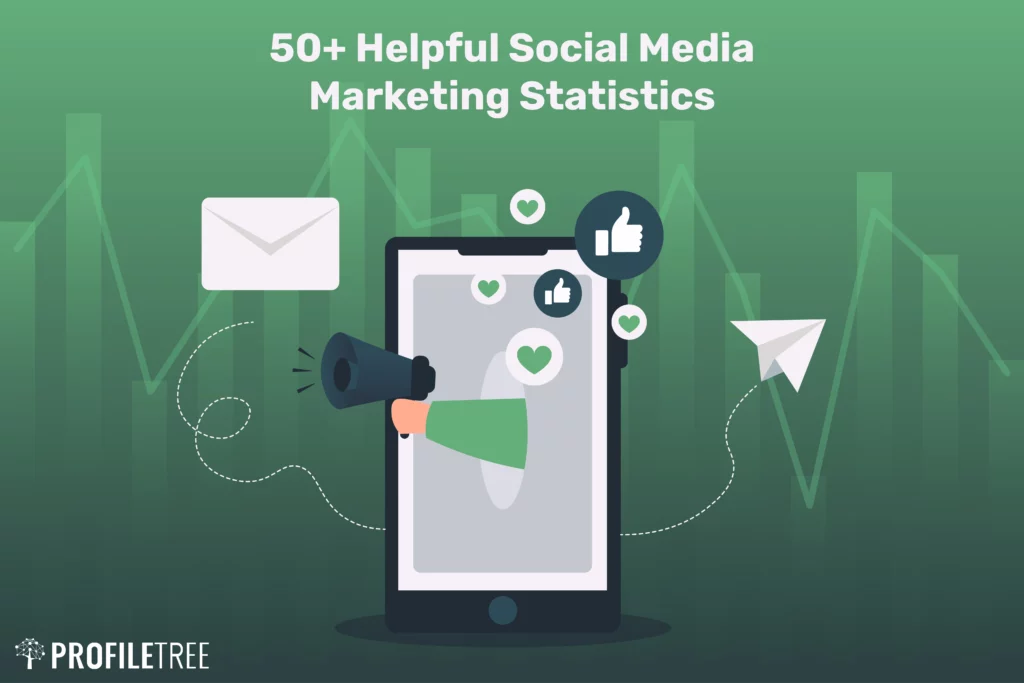In today’s digitally driven landscape, maintaining a solid online presence is essential for any small business hoping to thrive. Due to their extensive reach and diverse functionalities, social media platforms have become essential for small businesses to engage with customers, establish brand awareness, and stimulate growth. Understanding the power of social media statistics can equip you with the knowledge and insights necessary to build a winning social media strategy for your small business.
This article delves into the key statistics that reveal the current state of social media for small businesses, offering valuable insights into platform usage, effectiveness, and essential trends. Utilising data effectively empowers you to confidently navigate the social media terrain and unleash the complete potential of this formidable marketing tool for your small business.
Social Media Usage by Small Businesses: Embracing the Digital Landscape
The statistics paint a clear picture: social media for small businesses has become indispensable and is also experiencing rapid adoption. In 2021, 91% of small businesses reported actively using social media platforms, signifying a significant 6% jump from just one year prior. This increasing trend highlights the expanding acknowledgement of social media’s capacity to reach target audiences and foster business expansion among small enterprises.
Year-over-Year Growth
The story doesn’t end there. The adoption rate of social media for small businesses continues to climb at an impressive pace, demonstrating their increasing confidence in the platform’s effectiveness. Studies show a year-over-year increase in adoption, suggesting that many small businesses recognise the need to establish a digital footprint and engage with customers online.
Industry-Specific Variations
The statistics reveal variations in adoption rates across different industries. While some sectors, such as retail and hospitality, consistently boast high social media usage rates, others are catching on quickly. This industry-specific analysis can be valuable for small businesses, allowing them to benchmark their social media activity against their industry peers and identify potential areas for improvement.

Geographical Distribution
Understanding the geographical distribution of social media usage can also be crucial. Studies may reveal regional trends in platform preferences and user behaviour, which can inform localised social media strategies for businesses operating in specific areas.
By delving deeper into the statistics surrounding social media usage for small businesses, we gain a nuanced understanding of the current landscape. This knowledge empowers small businesses to embrace this powerful tool and craft targeted and effective social media strategies that resonate with their unique target audiences and drive tangible business results.
Effectiveness of Social Media for Small Businesses: Quantifying the Impact

The statistics highlight the widespread adoption of social media for small businesses and underscore its tangible impact on their success. A significant 63% of small businesses reported achieving success through their social media efforts, showcasing its effectiveness in driving various business objectives.
This success translates into measurable benefits, empowering small businesses to:
Boost Brand Awareness
Social media platforms provide a potent and cost-effective channel for small businesses to expand their reach to a wider audience than ever before. By strategically crafting content and utilising targeted advertising, businesses can nurture brand recognition, cultivate a positive brand image, and ultimately engage with potential customers who might not have discovered them otherwise.
Connect Directly with Customers
Unlike traditional advertising, social media fosters a two-way dialogue between small businesses and their customers. This communication allows for direct engagement, real-time feedback gathering, and relationship building. By actively engaging with comments and messages, businesses can nurture a sense of community and build loyalty among their customer base.
Drive Sales and Generate Leads
Social media platforms enable small businesses to exhibit their products and services to a specific audience, conduct advertising campaigns, and facilitate direct transactions. By implementing strategic social media marketing campaigns, these businesses can generate leads, nurture them through the sales funnel, and ultimately drive sales conversions.
Furthermore, the statistics underscore the significance of going beyond the mere presence of social media for small businesses. While having a profile is advantageous, adopting a well-defined and strategic approach that aligns with each small business’s specific goals, target audience, and brand voice significantly enhances the platform’s effectiveness. This approach should entail creating engaging content, scheduling regular posts, and leveraging relevant social media analytics to monitor progress and optimise future campaigns.
By comprehending the measurable impact of the use of social media for small businesses and recognising the diverse benefits of the platform, small businesses are motivated to invest in developing and executing well-defined social media strategies. By adopting a strategic approach, they can optimise the potential of this powerful tool and achieve sustainable growth in the constantly evolving digital landscape.
Popular Social Media Platforms for Small Businesses

Navigating the extensive range of social media platforms for small businesses can be daunting. However, comprehending the popularity and customer demographics of each platform can assist businesses in selecting the most relevant channels to connect with their target audience.
Facebook: The Social Media Giant
- Boasting the most extensive user base with over 2.9 billion monthly active users, Facebook remains a dominant force in the social media landscape.
- This platform offers versatility, allowing businesses to share various content formats, run targeted advertising campaigns, and engage with customers through comments and messages.
- Facebook is well-suited for reaching a wide-ranging audience spanning various demographics, rendering it a valuable asset for businesses catering to diverse customer profiles.
Instagram: A Visual Powerhouse
- Instagram, boasting over 2 billion monthly active users, prioritises visually captivating content, rendering it particularly suitable for businesses with products that excel in photography and videography.
- Businesses can exhibit their products on this platform, offer behind-the-scenes insights, and engage with customers through features like Stories, Reels, and direct messages.
- Instagram effectively reaches a younger demographic and highly engaged individuals with visual content, making it particularly suitable for businesses targeting these groups.
LinkedIn: The Professional Network
- LinkedIn boasts over 830 million monthly active users and is primarily used for professional networking and B2B (business-to-business) connections.
- This platform allows businesses to share industry news, showcase company culture, and establish themselves as thought leaders.
- LinkedIn is a valuable tool for businesses targeting other businesses or professionals within their industry or niche.
Pinterest: A Visual Inspiration Board
- With over 433 million monthly active users, Pinterest is a visual discovery engine where users save and share ideas.
- This platform provides a unique chance for businesses to visually present their products or services attractively, effectively driving traffic to their websites.
- Pinterest is ideal for businesses in aesthetically driven industries such as fashion, home décor, and travel, as it allows them to capture users’ attention by actively searching for inspiration and making purchasing decisions.
While the aforementioned platforms hold dominance, small businesses should also consider exploring other options, such as Twitter, YouTube, and TikTok, depending on their target audience, industry, and marketing goals. By comprehending each platform’s statistics and customer demographics, small businesses can make informed decisions when selecting the most suitable social media channels to engage with their target audience and achieve their business objectives.
Posting Frequency and Investment: Striking the Right Balance for Small Businesses

Having a presence on social media for small businesses is crucial, yet it’s just the beginning. To fully harness the potential of these platforms and amplify their impact, small businesses need to strike a balance between their posting frequency and the resources they invest. This segment delves into the statistics associated with these aspects, revealing crucial insights into how small businesses can refine their social media strategy and achieve their desired outcomes.
Consistency is Key
- The statistics reveal that 52% of small businesses post on social media daily. This consistent approach allows them to stay top-of-mind with their audience, maintain engagement, and maximise the reach of their content.
- While daily posting may not be feasible for all small businesses, developing a regular posting schedule is crucial. This schedule should be tailored to the chosen platforms, target audience, and available resources to ensure consistent content creation and delivery.
Investing in Social Media
- Recognising the value of social media, 35% of small businesses intend to boost their marketing spend on these platforms. This increased investment reflects the growing awareness of the platform’s potential to drive business growth and the need for dedicated resources to maximise effectiveness.
- While significant financial investments are not always necessary, strategic allocation of resources, such as budget allocation for advertising or tools to streamline content creation, can significantly enhance the impact of small business social media usage.
Finding the right balance between posting frequency and investment is crucial for small businesses in the realm of social media for small businesses. While consistency is important, it should never come at the expense of quality. Through careful content planning, strategic engagement, and efficient resource allocation, small businesses can effectively strike this balance and fully leverage the potential of social media to achieve their marketing objectives.
The Importance of Engagement: Fostering Meaningful Connections
While reaching a broad audience holds value, the true power of social media for small businesses lies in building genuine connections with their target audience. This is where engagement becomes paramount.
Why Engagement Matters
- Statistics demonstrate that 61% of businesses prioritise engagement metrics such as likes, comments, shares, and mentions in their social media strategies. This prioritisation emphasises the recognition that engagement on social media for small businesses extends beyond mere audience reach and signifies the importance of fostering meaningful dialogues with their customers.
- Engaged followers are likelier to remember a brand, trust its recommendations, and ultimately become loyal customers. Fostering engagement allows businesses to build brand loyalty, generate positive word-of-mouth marketing, and cultivate a community around their brand.
Strategies for Encouraging Engagement
- Timely responses to comments and messages showcase the business’s appreciation for its customers’ opinions and nurture a sense of community.
- Asking open-ended questions in posts encourages followers to actively participate in the conversation and share their thoughts.
- Running contests and giveaways can generate excitement and incentivise user participation.
- Utilising relevant hashtags increases the discoverability of content and allows businesses to connect with a broader audience interested in specific topics.
By prioritising engagement and implementing these tactics, small businesses can transform their social media presence from a one-way communication channel into a vibrant platform for building genuine customer connections, fostering brand loyalty, and ultimately achieving lasting success in social media for small businesses.
Advertising on Social Media for Small Businesses

While organic social media usage can be highly effective, small businesses aiming to amplify their reach and achieve specific marketing objectives often turn to social media advertising. This section delves into the statistics surrounding social media advertising for small businesses.
Budget Allocation
On average, small businesses allocate 8.7% of their total revenue towards their ad budget, emphasising the growing recognition of the potential return on investment (ROI) social media advertising for small businesses can offer. This investment enables businesses to target specific demographics, interests, and behaviours, ensuring their message reaches a highly relevant audience and maximises the effectiveness of their advertising campaigns.
Potential ROI
The return on investment (ROI) from social media advertising campaigns can be significant, making it a valuable tool for small businesses in the realm of social media for small businesses. While specific figures can vary depending on industry, campaign goals, and implementation strategies, the potential for significant ROI incentivises small businesses to explore this avenue.
Integrating social media advertising into their overall social media strategy allows small businesses to complement their organic efforts and reach a wider audience, ultimately driving brand awareness, website traffic, lead generation, and sales conversions.
However, it’s crucial to remember that effective advertising on social media for small businesses demands meticulous planning and execution. By comprehending the available targeting options, crafting compelling ad copy and visuals, monitoring campaign performance, and optimising strategies, small businesses can maximise the effectiveness of their social media advertising budgets and achieve their desired marketing goals.
Building a Winning Social Media Strategy for Your Small Business
The data provided in this article unmistakably illustrates the significance of social media for small businesses as an essential tool in the contemporary digital landscape. The evidence is compelling, with 91% of small businesses actively leveraging social media and 63% attesting to its effectiveness.
By understanding social media usage statistics, platform preference, and engagement, small businesses can develop a winning social media strategy tailored to their unique goals and target audience.
Key Takeaways From this Exploration
- Small businesses’ widespread adoption of social media for small businesses highlights its growing importance in the digital landscape.
- Utilising a well-defined social media strategy tailored for small businesses is crucial for maximising the effectiveness of your social media presence.
- Selecting the most relevant platforms based on your target audience and industry is essential for reaching the right people in social media for small businesses.
- Balancing posting frequency and investment in social media for small businesses allows you to maintain a consistent presence without compromising quality.
- Prioritising engagement in social media for small businesses fosters meaningful connections with your audience and drives brand loyalty.
- Social media advertising for small businesses can be a powerful tool for amplifying your reach and achieving specific marketing goals.
By harnessing the insights gleaned from these statistics and implementing the outlined strategies tailored for social media for small businesses, you can transform your small business’s social media presence from a static online profile into a dynamic and effective marketing tool that drives brand awareness, customer engagement, and sustainable growth in the ever-evolving digital age.


